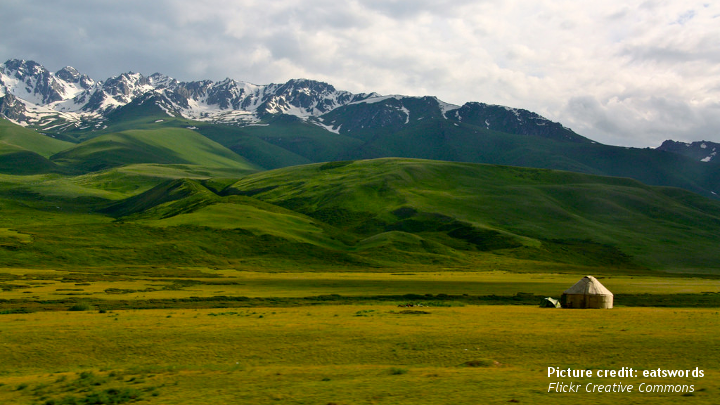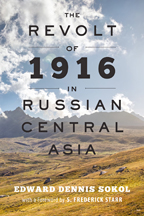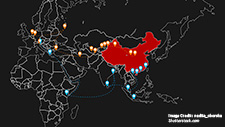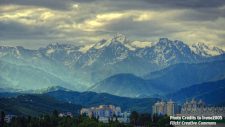The Revolt of 1916 in Russian Central Asia

Edward Dennis Sokol and S. Frederick Starr
 During the summer of 1916, approximately 270,000 Central Asians—Kazakhs, Kyrgyz, Tajiks, Turkmen, and Uzbeks—perished at the hands of the Russian army in a revolt that began with resistance to the Tsar’s World War I draft. In addition to those killed outright, tens of thousands of men, women, and children died while trying to escape over treacherous mountain passes into China. Experts calculate that the Kyrgyz, who suffered most heavily, lost 40% of their total population.
During the summer of 1916, approximately 270,000 Central Asians—Kazakhs, Kyrgyz, Tajiks, Turkmen, and Uzbeks—perished at the hands of the Russian army in a revolt that began with resistance to the Tsar’s World War I draft. In addition to those killed outright, tens of thousands of men, women, and children died while trying to escape over treacherous mountain passes into China. Experts calculate that the Kyrgyz, who suffered most heavily, lost 40% of their total population.
This horrific incident was nearly lost to history. During the Soviet era, the massacre of 1916 became a taboo subject, hidden in sealed archives and banished from history books. Edward Dennis Sokol’s pioneering Revolt of 1916 in Russian Central Asia, published in 1954 and reissued now for the first time in decades, was for generations the only scholarly study of the massacre in any language. Drawing on early Soviet periodicals, including Krasnyi Arkhiv ( The Red Archive), Sokol’s wide-ranging and exhaustively researched work explores the Tsarist policies that led to Russian encroachment against the land and rights of the indigenous Central Asian people. It describes the corruption that permeated Russian colonial rule and argues that the uprising was no mere draft riot, but a revolt against Tsarist colonialism in all its dimensions: economic, political, religious, and national. Sokol’s masterpiece also traces the chain reaction between the uprising, the collapse of Tsarism, and the Bolshevik Revolution.
A classic study of a vanished world, Sokol’s work takes on contemporary resonance in light of Vladimir Putin’s heavy-handed efforts to persuade Kyrgyzstan to join his new economic union. Sokol explains how an earlier Russian conquest ended in disaster and implies that a modern conquest might have the same effect. Essential reading for historians, political scientists, and policymakers, this reissued edition is being published to coincide with the centennial observation of the genocide.
Edward Dennis Sokol (1923–2014) earned his BA from Johns Hopkins University in 1947 and his PhD in 1952. S. Frederick Starris the founding chairman of the Central Asia−Caucasus Institute and Silk Road Studies Program. He is the author of Lost Enlightenment: Central Asia’s Golden Age from the Arab Conquest to Tamerlane.
“For me the tragedy of 1916 had always been a precursor to the national liberation movement of Kyrgyz people, although I did not realize the depth and reach of these events in the history of Central Asia. Edward Sokol’s The Revolt of 1916 was a revelation. The author portrays the people of Central Asia, as well as the formation of their identity and their rights for self-determination, in the big picture and not through Soviet eyes. His book gives the reader a new perspective on these events and allows us to reconsider history.”
— Zamira Sydykova, former Ambassador of Kyrgyzstan to the United States of America and Canada
Related Publications
-
ISDP Annual Report 2023
ISDP’s Annual Report for the year 2023. We look back on 2023, a year in which tensions and conflicts captured the strategic space in ISDP’s focus areas, making headlines around […]
-
China in Eurasia: Revisiting BRI amidst the Russia-Ukraine Crisis
This paper discusses China’s trade and connectivity plans under the Belt and Road Initiative (BRI) in the Eurasian region and the impact of the Russian invasion of Ukraine on Chinese […]
-
Promise And Peril In The Caucasus
America’s national security bureaucracy separates the Caucasus and the Middle East into different bureaus, with Central Asia in yet another office. This is part of the reason the U.S. has […]
-
The US and EU, and the Emerging Supply Chain Network: Politics, Prospects, and Allies
The Global Supply Chains have evolved from simply logistical achievements to being the bedrock of the global economy. Driven by technological advances and geopolitical shifts, this transformation underscores the critical […]
-
EU-Thailand FTA Negotiations: IUU Fishing and Human Rights Remain Obstacles
Thailand’s fishing industry, which at its height saw as many as 200,000 migrant workers from neighboring Laos, Myanmar, and Cambodia caught in a brutal system of abuse, withered global criticism […]




